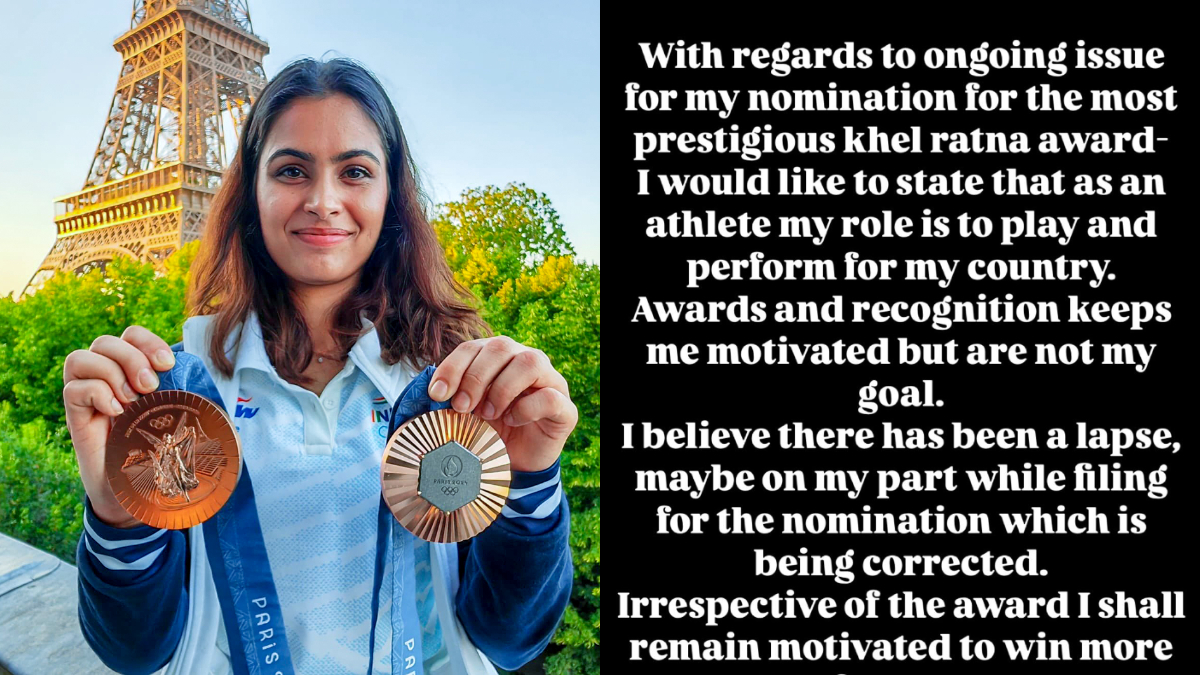Manu Bhaker's Khel Ratna Snub: A Shooting Star's Unexpected Controversy
The Indian shooting sensation, Manu Bhaker, has been making headlines recently, not for her incredible marksmanship on the range, but for an unexpected controversy surrounding her exclusion from this year's Khel Ratna awards. This double Olympic bronze medalist's absence has ignited a firestorm of debate, forcing the young champion to address the issue publicly. Discover the surprising twist behind her exclusion and the unexpected backlash that followed, in this captivating story of an athlete at the peak of her career facing unforeseen challenges.
Manu Bhaker's Statement: An Unintentional Lapse?
Following the announcement of the Khel Ratna awardees and her absence, Manu Bhaker took to social media, her preferred way of communicating with her ever-growing fan base. In her statement, she revealed an administrative oversight, admitting that a lapse might have occurred during the nomination process. This explanation attempts to dispel rumours and quell rising concerns about her controversial exclusion from one of India's most coveted sporting honours. She addressed speculation head-on and emphasized that her primary focus has always been, and continues to be, representing her nation with utmost pride on the field of play. She aims to avoid speculation and keep attention focused on her athletic performances. This transparency offers insight into a situation that's surprised even those who follow sports very closely.
The Aftermath of an Omission
This wasn't simply a quiet administrative oversight. The unexpected absence of Manu Bhaker from the Khel Ratna nominations list resulted in a wave of shock and disappointment. Given her remarkable achievements and inspiring performance, especially after the emotional rollercoaster she faced during the 2020 Tokyo Olympics, this has been deemed controversial and hard to fathom. The controversy is fuelled by both admiration for the athlete's determination and a frustration at the perceived oversight. Fans wonder how an athlete of her caliber could be overlooked.
The Tokyo Setback and Paris Triumph: A Resilient Spirit
Manu Bhaker's journey has been punctuated by both triumph and adversity. She first captured the attention of the sports world at the 2018 Youth Olympics, marking a swift climb toward stardom. Yet, even stars face setbacks. The 2020 Tokyo Olympics presented such a challenge for Bhaker when a malfunctioning pistol derailed her campaign, a painful and publicly humiliating setback. This heartbreak, however, only intensified her resolve. Bhaker's impressive comeback at the Paris Olympics, securing not one, but two bronze medals, demonstrates her character and her unyielding commitment to excellence. She showed amazing resilience. It truly is the comeback story of the century for an up-and-coming champion.
The Significance of a Khel Ratna Nomination
The Khel Ratna award isn't merely recognition; it’s an acknowledgment of exceptional achievement and consistent excellence, a hallmark in a remarkable sporting career. Many believe Bhaker is exactly that – a consistently exceptional athlete and more than worthy of receiving the award.
Social Media and Public Reaction: A Mixed Bag
This controversy also has a strong social media presence. Before the recent clarification, an earlier social media post where Bhaker expressed doubt about her deserving the award sparked widespread criticism, revealing a level of discomfort and potentially affecting the trajectory of this whole situation. She's since clarified and deleted the post. The ongoing debate highlights not just the controversy of her exclusion from the Khel Ratna awards, but also the power and sometimes volatile nature of social media, where the nuanced reality of sports performance frequently gets lost in quick judgments and sometimes overzealous responses.
The Debate's Significance in the Larger Sports Context
The debate sparked by Manu Bhaker's case raises concerns regarding the nomination process for National Sports Awards. Transparency and clarity are critical to maintain fairness and uphold integrity in such selections. While Bhaker herself might not directly benefit this time around, advocating for more clarity in selection criteria and procedural steps can positively influence the future.
Looking Ahead: Medals Over Awards?
Manu Bhaker's unwavering resolve remains unwavering. In a clear indication of what motivates her and fuels her achievements, her statement prioritized winning more medals for India. Her goal has always been clear; she plans to make future wins and victories her most impactful achievements and hopes to put this controversy firmly behind her and concentrate on her training and performance to meet her overall athletic goals. The focus shifts to the exciting prospect of witnessing her future sporting triumphs rather than debating past awards, or lack thereof.
A Future of Sporting Greatness
The world of Indian shooting waits with bated breath to see what this talented and increasingly resilient young star achieves next. The narrative around her may change – in time this might be less about the missing Khel Ratna, but instead viewed as a minor bump in the journey of a true champion.
Take Away Points:
- Manu Bhaker's omission from the Khel Ratna awards created a significant controversy.
- Bhaker attributed her exclusion to an unintentional oversight during the nomination process.
- The incident triggered broader discussion on transparency in the nomination processes for such prestigious awards.
- Her post-Tokyo Olympics Paris win is seen as a major sporting achievement for the country.
- While the current controversy seems unfortunate, Manu Bhaker is expected to achieve much more, far beyond her immediate circumstances.









